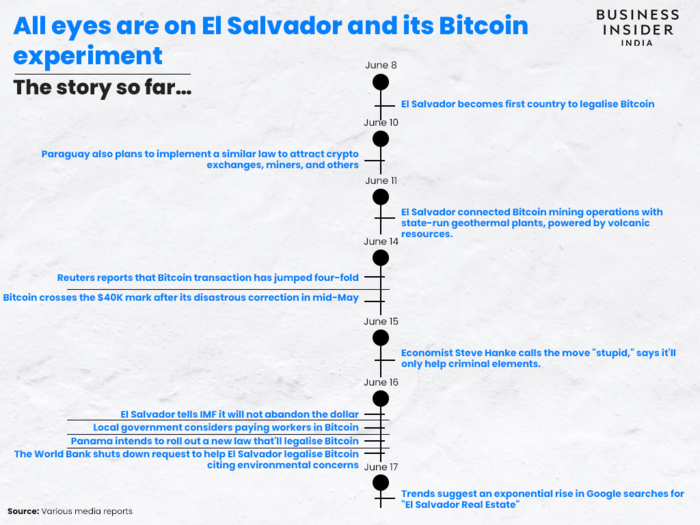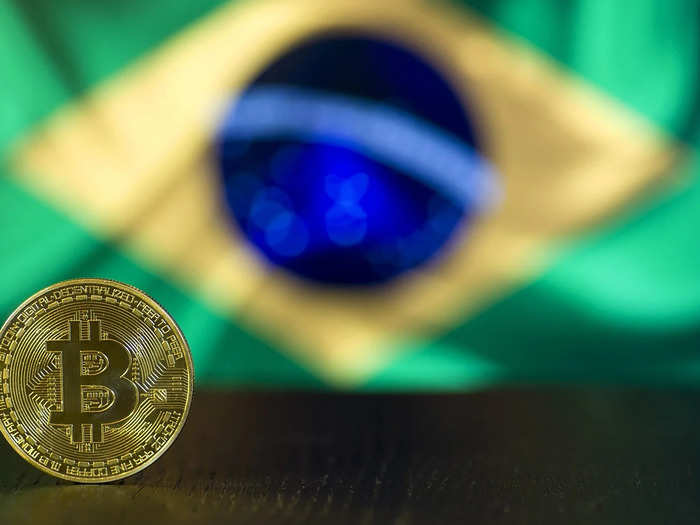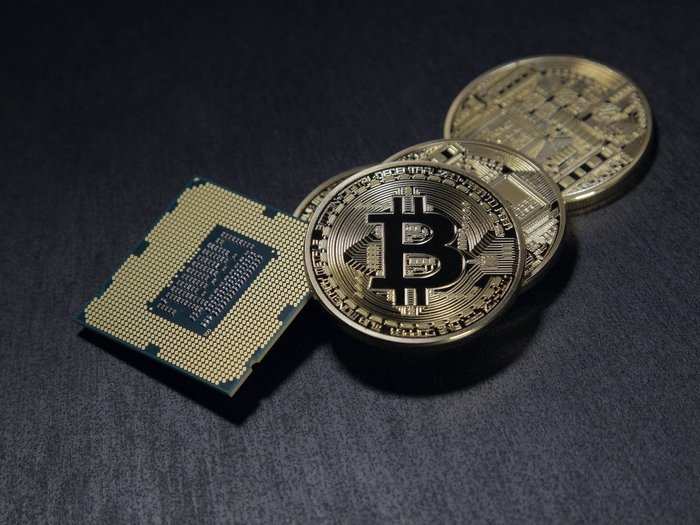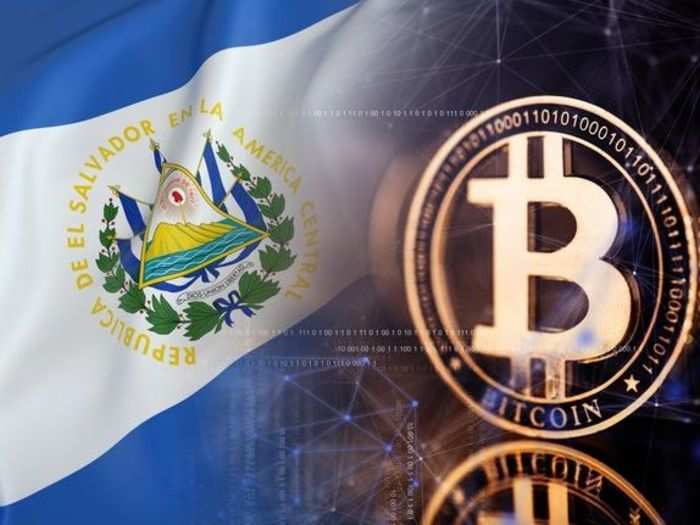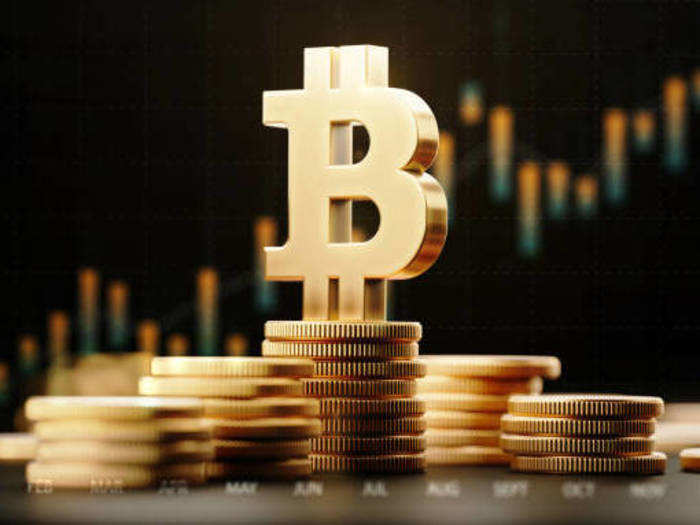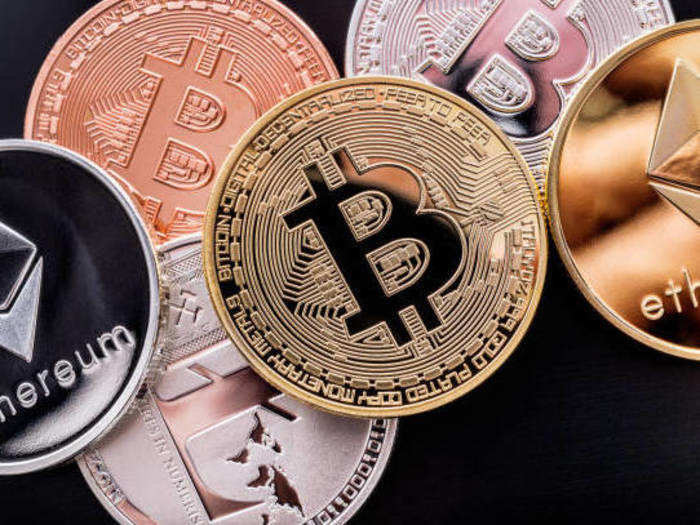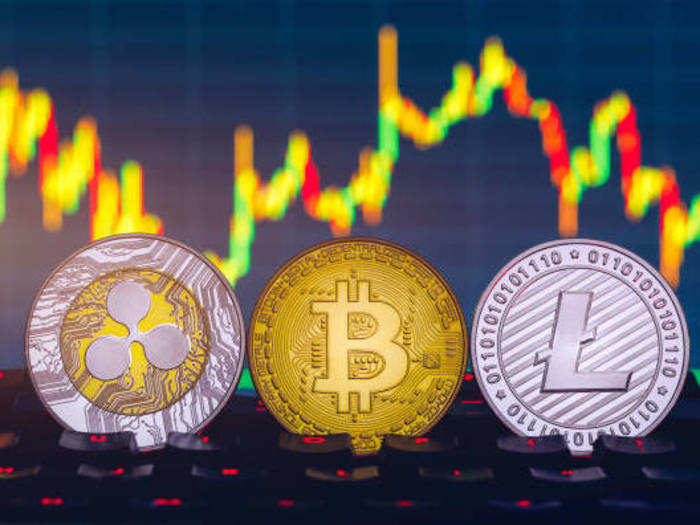- Bitcoin transactions have risen fourfold in El Salvador during the month of May as compared to last year.
- After passing the new law, El Salvador confirmed that it would mine the cryptocurrency using geothermal energy from its volcanoes.
- Following the new laws, the government has attached incentives like no capital gains tax on Bitcoin and permanent residence for crypto entrepreneurs.
- The World Bank isn't impressed by El Salvador's move. The international lender cited concerns over transparency and the environmental impact of Bitcoin mining.
El Salvador became the first country to make Bitcoin its legal tender. The move has kickstarted a micro-revolution with a dozen countries now considering the potential of
cryptocurrencies. However, the Bitcoin hype has no borders, and the world is keenly watching how the change unfolds.
Bitcoin, in theory, offers a quick and cheap way to send money across borders without relying on traditional and often costly remittance channels. Over the last week, every day has been exceptional in the cryptocurrency world with news pouring in from all corners of the planet.
Here's a quick look at how the crypto wave is sweeping across countries, companies, while trying to transform conventional finance concepts:
El Salvador’s Bitcoin experiment is on a roll, even if the World Bank wants no part of it
Timeline of events since El Salvador embraced Bitcoin as legal tender Pixabay
Bitcoin transactions jumped four-fold after the new law was passed
Central and Latin American countries are jumping onto crypto bandwagon after El Salvador's announcement Pixabay
Bitcoin transactions have risen four-fold in El Salvador during the month of May as compared to last year. The country is hopeful that Bitcoin remittances shall help change its fortune.
Data suggests the sharp increase in transfers is a phenomenon common across Central America. Supporters of the financial change point to it as a demonstration case for how digital currency could help a country where 70% don't have bank accounts.
El Salvador’s move is enticing its neighbouring countries to join the crypto hype
Central and Latin American countries are jumping onto crypto bandwagon after El Salvador's announcement Pixabay
Almost immediately after El Salvador legalised Bitcoin, Carlitos Antonio Rejala Helman — a Deputy of the Nation and Member of Congress in Paraguay — announced his plans to present a Bitcoin bill next month. The country may also initiate a project that will include Bitcoin alongside PayPal.
Rejala called on the nation to advance with the new generation in a tweet. According to him, the country offers no restrictions on foreign capital flows and the payment of dividends abroad. Paraguay also has one of the lowest costs of electricity in the region, which “makes it an attractive country to crypto investors."
Panama has its own plans to jump aboard the bandwagon as well. Even though the new alternative is yet to be tested in real life, smaller countries are keen on joining the trend as fiat currencies, like the US dollar, have bogged them down.
El Salvador wants to do Bitcoin the right way with energy from a volcano
El Salvador announced that it will use geothermal energy from volcanoes to power its Bitcoin mining operations Coingape
Bitcoin mining is under immense pressure from critics because it consumes a lot of energy. And, a majority of that comes from conventional sources like fossil fuels. Not only does that lead to added pollution but also depletes incredibly scarce resources.
After passing the new law, El Salvador confirmed that it would mine the cryptocurrency using geothermal energy from its volcanoes.
President Bukele said the country is already designing a mining hub that will use "very cheap, 100% clean, 100% renewable" energy from volcanoes to power the operation. In a tweet, he said the country's engineers had dug a new well to provide around 95 MW of green energy, backed by natural volcanic resources.
El Salvador’s love for Bitcoin has people looking to move in
El Salvador told the IMF that it will not abandon the US dollar Pixabay
Google trends show that there has been an exponential rise in English language searches for ‘El Salvador Real Estate’ since the country announced that Bitcoin will be accepted as legal tender.
Following the new laws, the government has attached incentives like no capital gains tax on Bitcoin and permanent residence for crypto entrepreneurs. The president also tweeted that the country will build a satellite infrastructure for its citizens in rural areas to connect to the internet and the Bitcoin network in places where connectivity is poor.
The El Salvador government is considering paying workers in Bitcoin
Local workers may be paid using Bitcoin Pixabay
Early reports hinted that the government could soon roll out salaries in Bitcoin. El Salvador's Department of Labor and Social Welfare has clarified that it is not within its authority to determine whether wages can be paid in the cryptocurrency.
Currently, the new law forces firms to accept Bitcoins when offered as payment for goods and services. The government is now debating whether Bitcoin should be used to pay employee salaries in the country since it would boost adoption.
But, not everyone is on the same page — some think the move is ‘stupid’
Economist Steve Hanke says El Salvador’s move will only help criminal elements thrive Atlas Network
Steve Hanke, a professor at Johns Hopkins University, warned that the move might "crash the economy completely." He served as a senior economist under President Ronald Reagan's administration from 1981 to 1982.
"Cryptocurrencies are the future of money. But, unfortunately, Bitcoin is not," he added. According to Hanke, Bitcoin traders from regions like Russia and China could now target El Salvador to alter their holdings, essentially draining the country of its US dollars. JPMorgan reiterated similar views but opted for a milder language.
The World Bank wants to keep its distance and the IMF is uncertain
World Bank refuses to help with legalising Bitcoin citing environmental concerns Pixabay
The World Bank isn't impressed by El Salvador's move. The international lender cited concerns over transparency and the environmental impact of Bitcoin mining. Even though the country asked for help on the technology side, the World Bank has politely — but affirmatively — turned it down.
The IMF (International Monetary Fund) was not as harsh and said the adoption as legal tender raises several macroeconomic, financial and legal issues that require meticulous analysis."We are committed to helping El Salvador in numerous ways, including currency transparency and regulatory processes," it said.
Bitcoin crosses the $40K mark after its disastrous correction in mid-May
El Salvador's announcement provided temporary relief to Bitcoin's price dip Pixabay
Bitcoin and the overall cryptocurrency industry suffered a massive blow in mid-May when a bearish correction ensued. Multiple factors contributed to the fall -- Elon Musk's moody tweets, Tesla's decision to stop Bitcoin payments, China's clampdown on miners, and the rise of bubble-like altcoins. Following the volatility, the world's largest crypto gained as much as 4.5% on June 14 to $41,020, extending its rally to a second day.
However, the uptick was temporary. Bitcoin’s value went back down to below $38,000 as of June 18.

